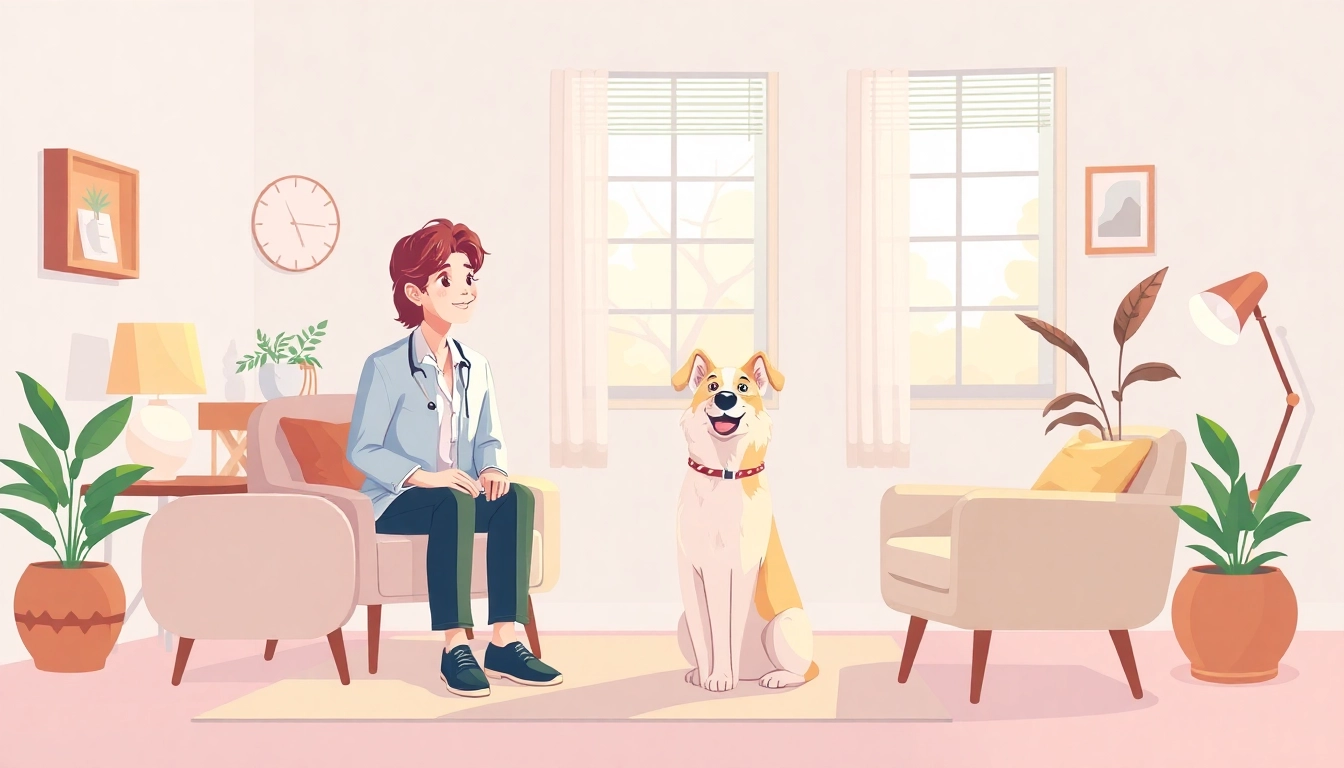Enhance Your Well-being with a Compassionate Psychologist with a Dog in Sydney

Understanding the Benefits of Therapy Animals
What is Animal-Assisted Therapy?
Animal-Assisted Therapy (AAT) is a therapeutic intervention that incorporates animals into the treatment process, helping to improve both physical and mental health. This innovative approach aligns well with modern psychological practices, where practitioners seek to enhance their therapeutic methods through creative and compassionate means. At Psychologist with a dog Sydney, we understand that the bond between humans and animals can offer profound healing benefits. Through AAT, therapy dogs like Wattle not only contribute to the emotional safety of sessions but also bring an element of joy and comfort that conventional techniques may have missed.
Positive Impacts on Mental Health
The presence of therapy animals can lead to various positive outcomes for individuals dealing with a myriad of mental health challenges. Research has shown that interactions with animals can reduce feelings of loneliness, anxiety, and depression. The soothing presence of a therapy dog can help lower cortisol levels (the stress hormone) and promote the release of oxytocin, often referred to as the love hormone, which can lead to enhanced feelings of connection and trust during therapy.
In addition, AAT can bolster emotional regulation and resilience, allowing clients to feel empowered and engaged in their therapeutic journey. The non-judgmental nature of animals provides a safe space for clients to express their emotions freely. Through engaging with Wattle in sessions, clients can experience enhanced emotional expression and increased comfort, providing an effective adjunct to traditional therapy.
The Role of a Therapy Dog in Sessions
Wattle, our therapy dog, plays a critical role in facilitating positive therapy experiences. Her calming presence can help to bridge communication gaps, especially for clients who may feel hesitant in traditional therapeutic settings. During sessions, Wattle may provide comfort by lying beside clients, offering a sense of companionship that prompts discussion and reflection.
Moreover, therapy dogs can assist in building trust and rapport between clients and psychologists. By integrating AAT into our sessions, we encourage a more relaxed environment, where clients can engage in deep conversations about their emotions and challenges with less anxiety. The incorporation of a therapy dog not only enriches the therapy experience but also allows for new, dynamic ways to approach mental health treatment.
Our Unique Approach to Therapy
Person-Centered Therapeutic Strategies
At Heart and Hound Psychology, we embrace a person-centered approach to therapy, wherein the individual’s unique experiences, strengths, and goals shape the therapeutic process. This collaborative method ensures that therapy is responsive to the specific needs of each client, facilitating a personalized experience that maximizes engagement and effectiveness.
Understanding that each person journeys through their mental health challenges differently, we utilize various therapeutic modalities to best suit individual requirements. From cognitive-behavioral techniques to mindfulness practices, our goal is to foster an environment where clients feel empowered to take an active role in their healing.
Combining Traditional Methods with Innovative Techniques
Our practice is not limited by conventional wisdom; instead, we take pride in blending traditional psychological techniques with innovative therapies such as Virtual Reality (VR) and AAT. This hybrid model addresses diverse learning and coping styles, promoting a more comprehensive understanding of one’s mental health.
The integration of VR therapy allows clients to engage in immersive and controlled environments where they can confront their fears and practice new skills. When combined with the companionship of a therapy dog, clients can better navigate their experiences, fostering resilience in ways that may not be possible through traditional approaches alone.
Cultivating a Safe and Supportive Environment
Creating a safe and nurturing space is paramount to the therapeutic process. Our clinic is designed to be welcoming, where clients feel truly seen and understood. We prioritize confidentiality, compassionate communication, and active listening, addressing any initial anxieties clients may have when entering therapy.
Through our tailored approach, every session is an opportunity to explore thoughts and feelings in a respectful and empowering atmosphere. By reinforcing this sense of safety, we enable clients to delve deeper into personal issues while developing strategies for sustainable mental health.
Individual In-Person Sessions in Sydney
What to Expect During Your First Visit
Your first visit to Heart and Hound Psychology is designed to be an informative and comfortable experience. During this initial session, you will meet with Jacob, the clinical psychologist, who will discuss your goals and motivations for seeking therapy. This meeting is crucial in establishing a foundational understanding of your unique circumstances.
Wattle, our therapy dog, may also be present to help reduce any potential anxiety or discomfort. The goal of this session is for you to feel at ease, giving you the space to express yourself openly, ask questions, and outline what you hope to achieve through therapy.
Benefits of Face-to-Face Interaction
In-person sessions provide invaluable advantages, including the opportunity for direct communication that encompasses non-verbal cues. The therapist can observe body language, tone, and emotional reactions more closely, which can be integral to understanding how you are processing your experiences.
Moreover, face-to-face interactions enable the development of a deeper connection and rapport, which are pivotal to successful therapeutic outcomes. The immediacy of in-person engagement helps facilitate a trusting relationship, enabling clients to feel safe and supported while navigating sensitive topics.
Creating a Trusting Therapeutic Relationship
The capacity to build trust is vital for effective therapy. At Heart and Hound Psychology, we make it a top priority to cultivate a genuine, collaborative relationship with clients. Through unfaltering support and empathy, we aim to create an environment where clients feel respected and validated throughout their therapeutic journey.
Wattle’s soothing presence further enhances trust, providing clients with comfort as they express vulnerabilities. Our approach emphasizes that therapy is a partnership; by establishing mutual respect and open communication, we foster a collaborative path toward achieving well-being.
Flexible Telehealth Options
Convenience of Therapy from Home
With the advent of technology, telehealth sessions have emerged as a convenient alternative for many clients. By offering flexible options, we cater to those who may prefer the comfort of their own environment during therapy. Telehealth ensures that geographical and time constraints do not hinder access to quality mental health care.
This mode of therapy allows clients to engage in sessions from the comfort of their homes, minimizing the stress associated with travel and scheduling conflicts. Wattle may not be physically present, but her spirit of support and engagement can still be integrated into the therapeutic methods used in the session.
Maintaining Continuity in Your Care
Therapy is often a long-term process, and maintaining continuity in care is essential for sustained growth. Our flexible telehealth options enable clients to seamlessly shift between in-person and remote sessions based on their needs. Whether you’re facing unexpected life changes or wish to maintain a therapeutic routine while traveling, this adaptability ensures you receive consistent mental health support.
Using Technology to Enhance Sessions
Utilizing technology in therapy can enhance the overall client experience. For instance, through telehealth, therapists can share resources, practice exercises, and worksheets in real time, leading to an interactive session that goes beyond traditional talking therapy.
Moreover, technology can supplement sessions by allowing clients to engage in mindfulness apps or guided meditations before or after their meetings, further enriching their therapeutic journey. The integration of technology creates a dynamic experience that resonates with a modern lifestyle.
Innovative Treatments: Virtual Reality Therapy
How VR Therapy Works
Virtual Reality Therapy (VRT) is an emerging frontier in mental health treatment, utilizing immersive digital environments to provide a controlled and safe space for clients. This innovative technology allows individuals to confront fears, practice exposure scenarios, or rehearse social skills in a way that feels real without the immediate risks associated with real-life exposure.
Our VR therapy sessions in Sydney are designed to create a personalized experience tailored to individual needs. A trained psychologist guides clients through various simulations, providing support and feedback as they navigate their emotions and reactions. The capability to simulate experiences can be particularly effective for those struggling with anxiety disorders, phobias, or PTSD.
Real-World Applications and Success Stories
Numerous studies showcase the effectiveness of VR therapy across various demographics. Success stories highlight cases where clients facing social anxieties have utilized VR environments to practice social interactions, leading to increased confidence in real-life situations. Others with phobias, such as fear of flying, have reported reductions in anxiety levels after engaging in gradual exposure through VR.
The versatility of VR technology can be tailored to address diverse mental health challenges, including depression, post-traumatic stress disorder, and stress management. These immersive experiences can make therapy more enjoyable and engaging, promoting a proactive approach to mental well-being.
Combining VR with Traditional Psychotherapy
VRT serves as an exceptional complement to traditional psychotherapy methods. By integrating VR experiences with conventional discussions, therapists can dissect the thoughts and feelings experienced during simulations, creating a rich foundation for further exploration.
This synergy fosters a holistic understanding of the self, encouraging clients to engage deeply with their mental health journey. The multi-faceted angle of combining VR with traditional methods allows for effective skill-building and insight acquisition, resulting in long-lasting personal growth.
At Heart and Hound Psychology, we strive to offer comprehensive mental health support grounded in innovation, compassion, and individualization. Whether through our unique approaches integrating therapy animals or advanced technologies, we are committed to guiding clients towards improved well-being and a more fulfilling life.




